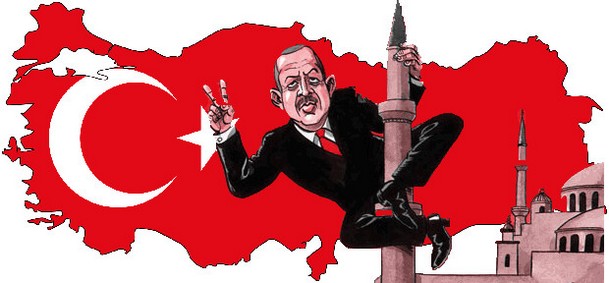
ref:topbtw-3080.html/ 5 Settembre 2021/A


Erdogan: ma quando verrà mandato in pensione ?
New York
Turkish Imperialism: When Will Turkey Annex Northern Syria?
In its quest to fulfill its expansionist ambitions, Turkey is pursuing a systematic Turkification policy in areas
under its control in northern Syria.
This takes various forms-demographic, economic, educational-and even the orchestration of environmental extermination.
Fundamental to this strategy is the ethnic cleansing
of hundreds of thousands of indigenous Kurds and the resettling of Arabs and Turkmen in their place.
Ankara's Turkification package includes, among other things, historic claims and changing the names
of villages and public squares.
Turkey and its proxies provide various essential services for the locals with the eventual object of linking Syrian
cities and towns to Turkish provinces and making their inhabitants completely dependent on Turkey.
Ultimately, Ankara seeks to impose a fait accompli, possibly aiming to redraw borders at some point in the future.
How long will the international community shut its eyes to this creeping neo-Ottoman imperialism?
Exploiting the Syrian Civil War
Throughout a decade of war in Syria, the conflict between rival forces has focused on demographic change as a
goal rather than an outcome.
The battles have provided the warring parties with rare opportunities to up root local populations belonging
to their opponents' sects or ethnicities.
The three current players in Syria-Russia, Turkey, and Iran-appear to have agreed to partition Syria into
zones of influence that resemble demographically homogeneous, autonomous territories.
This approach seems consistent with the fact that Sunni Arabs were displaced from southern and central Syria while Kurds
and Christians were expelled from the north.
Simultaneously, new inhabitants-affiliated with each side-were transferred from other areas in order to resettle
in the occupied territories.
This strategy was most apparent in the Turkish-controlled regions in northern and northeastern Syria, which have
been subjected to an all-out, systematic identity change based on a gradual process of using "soft power" to
solidify Ankara's influence.
During the past five years, Turkish forces launched four military operations that led to the establishment
of four border zones under their control.
The first was Euphrates Shield in August 2016, which targeted Aleppo's northern countryside.
The second, Olive Branch, took control of Aleppo's northwestern countryside in January 2018.
The third, Peace Spring,
seized areas east of the Euphrates River in October 2019.
These operations focused on Kurdish cities and towns under the pretext of pursuing Syrian Democratic Forces (SDF)
fighters, whom Ankara accuses of association with the Turkey-based PKK (Kurdistan Workers' Party), recognized
as a terrorist organization by Turkey, the United States, and the European Union.
Last year, the Turkish army launched Operation Spring Shield in the Idlib governorate following a military assault
by the Syrian regime to regain control over vast areas in the northwest.
That assault ended with a ceasefire agreement between Damascus's ally Russia and Turkey in Idlib in March 2020.
As a result of these actions, Turkey now controls more than 8,000 square kilometers in Syria,
or nearly 4.9 percent of the war-torn country.
Between 12,000 and 15,000 Turkish soldiers are stationed there.
The major cities under Turkish control are Azaz, Marea, al- Bab, Jarabulus, Afrin, Ras al-Ayn (Serê Kaniyê),
and the town of ar-Ra'i.
Ankara has also formed affiliated Syrian militias of some 80,000 to 100,000 fighters.
Most go by Turkish and Ottoman names, notably "Sultan Murad," "Mehmed the Conqueror," the "Samarkand Brigade,"
and "Suleiman-Shah," which yielded a group of youth fighters in April 2019 dubbed "Ertugrul's Grandsons."
Demography and Identity
Turkey has various plans to achieve its scheme.
Turkish military operations displaced between 300,000 and 350,000 Kurdish civilians from their towns and subsequently
blocked them from returning.
Concurrently, Turkish authorities brought hundreds of thousands of displaced Arab and Turkmen Syrian civilians
from the countryside of Damascus, Homs, Hama, Daraa, and Idlib to settle in the Kurdish region.
This measure was undertaken based on a Turkish-Russian understanding that had the approval of Iran and the Syrian regime.
The Turks settled dozens of Turkmen families in villages near the Kurdish city of Afrin, allowing them to seize lands
in the Afrin countryside and building seven "model" villages to settle additional families of loyalist
factions, particularly Turkmen.
One of the projects, "Basma," is sponsored by the Kuwaiti-backed White Hands association.
It includes a mosque and a Qur'an memorization center with support from an Arab-Israeli association,
Alaysh Bkrama (Living With Dignity).
Meanwhile, the so-called Salvation Government, led by al-Qaeda's formal affiliate in Syria, Hay'at Tahrir ash-Sha'm
(the Levant Liberation Committee), is reportedly planning to create a civil registry department and local
councils linked to Turkey and issue new ID cards in areas under its control in Idlib and its countryside.
In a December 2020 circular, the Turkish-appointed local council in the Kurdish city of Ras al-Ayn in Hasakah governorate,
near the Iraqi border, called on Iraqis who were said to be residing in the city and its countryside
to apply for ID cards.
As there are no records documenting the presence of Iraqi inhabitants in the area,
it appears that these people settled there with Turkish backing.
It is noteworthy that most of them are Iraqi Turkmen who fought with terrorist factions across the border
and were given homes that had been confiscated from their displaced owners.
Ankara has used the Turkistan Islamic Party, a Uighur Islamic faction grouped in Idlib and considered
a terrorist movement, to fight the Kurds and offered to compensate its members by settling them and their
families in Syria.
Turkey has also taken steps to wipe out the Syrian identity itself.
Syrians in the Aleppo countryside were instructed to obtain new ID cards that have a special code linked to
the civil registry departments in the provinces of Hatay,
Kilis, and Gaziantep in southern Turkey.
Even vehicle registration plates and driver's licenses are now linked to the Turkish system.
In addition, Turkey is using the Turkmen minority in Syria to implement its plans. In December 2012, the Syrian Turkmen
Association was established in Istanbul with the aim of creating an organizational structure for them.
In March 2013, it was renamed the Syrian Turkmen Assembly during a meeting attended by former Turkish foreign minister
Ahmet Davuto?lu, who stressed in a speech that his country "will continue to stand by the Syrian Turkmen
under any circumstances."
In November 2018, through Ankara's patronage, the assembly organized an event dubbed the "Nation Conference" in Ra'i,
during which it adopted a flag to indicate that the Turkmen people now have their own symbol and are to
be considered a nation.
The assembly, which moved its headquarters to Syria in July 2019, usually falsifies the number of Turkmen in Syria.
In the absence of official statistics, the figure of 100,000 is considered a reasonable estimate of the size
of the Turkmen population there.
The assembly bluntly inflates the figure to at least 1.5 million.
The assembly is also thought to be linked to the ultranationalist Grey Wolves movement in Turkey and routinely
coordinates with Hay'at Tahrir ash-Sha'm.
Olives, Starvation, and Ransom
One demographic engineering weapon Turkey is using in the region is to cut off the livelihoods of the
indigenous Kurdish population in an attempt to push them out.
Olive crops constitute the main source of income for Kurds, the majority of whom are farmers, unlike the Arab
and Turkmen settlers who are mostly small traders and craftsmen.
Turkish-backed groups regularly uproot and sell olive trees as firewood in Turkey.
Although it is difficult to calculate the exact number of olive trees in the Kurdish region, most
estimates place it at 12-18 million trees, which annually produce 60,000-70,000 tons of olive oil.
A report issued by Human Rights Organization-Afrin documented the cutting down of more than 314,400 olive trees
for "firewood trading" and noted that more than a third of the area allocated for agriculture had been burned
down over the past three years.
Moreover, the Turkish-backed groups seize a large portion of the Kurds' olive crop
by force of arms and sell it to Turkish merchants.
At the same time, they prevent Kurdish farmers from selling their oil outside the Turkish-controlled region
without prior permission, causing prices to plummet.
The value of the looted oil is $150-200 million, a quarter of which goes to the armed groups and their
civil administrations in the form of taxes ranging from 10-20 percent[19] in exchange for allowing
Kurdish farmers to harvest their olive orchards, which translates to earnings of roughly $15-40 million per year.
In November 2018, Turkish agriculture minister Bekir Pakdemirli told parliament that 600 tons of olives had entered
the country. He said, "We do not want revenues to fall into PKK hands.
We want the revenues from Afrin to come to us.
This region is under our hegemony."
Merchants who buy oil from Kurdish farmers operate under the supervision of the armed groups, who ensure
that they buy it at half price and transport it by trucks directly to Turkey.
The oil is even sold in European and U.S. markets branded as a Turkish product.
Corresponding reports reveal that the Turks sell the olive oil to Spain through a number of intermediary companies.
It is mixed with Turkish oil before being exported under invented brand names.
In November 2018, the Turkish newspaper Yeni ?afak, known for its hardline support of President Recep Tayyip Erdo?an,
reported that the Turkish Agricultural Credit Cooperatives was helping to sell Afrin's olives internationally,
and that the "Afrin olive market worth $200 million annually.
It will be brought back to the Syrian people."
A similar tool of demographic engineering is forced starvation.
Since the beginning of 2021, the Turkish authorities have deliberately starved the region by reducing Syria's share
of the Euphrates River, which is a major source of drinking water and essential to agriculture and
electricity production.
A large number of irrigation stations on the banks of the Euphrates on the Syrian side are now out of service,
and generating electricity is no longer possible due to the drop in water flow from Turkey from 500 to less than 200
cubic meters per second-a move that affects nearly 2.5 million Syrians.
These measures violate the agreement between the three riparian countries-Syria, Iraq, and Turkey[26]-and will
eventually lead to an environmental catastrophe and a humanitarian crisis that will threaten food security in the
Kurdish communities.
At the same time, Turkey and its loyalist groups push the last remaining Kurds to flee by
harassing them through kidnappings and ransom demands, tactics that force many to leave out of fear for their families.
The Human Rights Organization-Afrin report disclosed that approximately 7,343 cases of kidnapping
have been documented over the past three years, hundreds of which targeted women.
Last year, 987 people were kidnapped, including 92 women.
Civilians are often abducted and held hostage pending payment of thousands of dollars in ransom money.
( GAGRULE - Rauf Baker )

